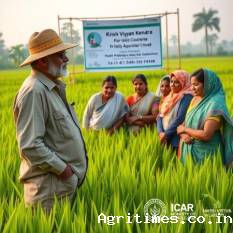NEW DELHI, 20 June 2025: In a major push toward field-driven agricultural reform, Union Minister for Agriculture and Farmers’ Welfare Shivraj Singh Chouhan announced on Wednesday that Krishi Vigyan Kendra (KVK) scientists will now spend at least three days a week directly in farm fields. The decision comes as part of the government’s commitment to transform Indian agriculture through deeper engagement, science-led solutions, and structured grassroots support.
Speaking at a press conference, Chouhan declared, “The Viksit Krishi Sankalp Abhiyan has been a huge success, and we are now moving from campaign to movement. Scientists must step out of labs and walk into fields. That’s where real change begins.”
Field-Level Reforms Backed by Science
Each KVK will now act as a nodal agency at the district level, bringing together agronomists, extension experts, and farmers under a single coordinated framework. These local teams will address urgent on-ground needs and provide timely solutions to farming challenges.
Chouhan further pledged to personally visit farms twice a week to interact with cultivators and understand their realities first-hand. He said the goal is to ensure science, policy, and practice are fully aligned.
To strengthen state-level interventions, the Indian Council of Agricultural Research (ICAR) will appoint state-specific nodal officers. These officers will oversee scientific field trials; diagnose region-specific issues; offer targeted agronomic advice; and liaise with state governments on coordinated strategies.
Under the Viksit Krishi Sankalp Abhiyan, 2,170 teams of scientists, officials, and agricultural experts have so far visited over 1.42 lakh villages, engaging directly with more than 1.34 crore farmers.
Chief Ministers, Union and State Ministers, MPs, MLAs, and local panchayat representatives actively participated, making it one of the most extensive agricultural outreach efforts in Indian history.
Action Against Substandard Seeds and Pesticides
During the campaign, farmers repeatedly raised concerns over low-quality seeds and pesticides. In response, the Ministry will strengthen the Seed Act and tighten quality control regulations to ensure only certified inputs reach India’s farmlands.
“Poor seeds and fake pesticides ruin harvests and lives. This ends now,” Chouhan asserted.
Next Steps: Soybean, Cotton, Sugarcane Missions
The campaign will relaunch during the rabi season, with targeted follow-up action plans for key crops. First up is soybean, with a stakeholder consultation scheduled for June 26 in Indore.
Similar missions for cotton, sugarcane, pulses, and oilseeds will follow.
A national-level hybrid meeting on June 24 at Pusa Institute will bring together scientists, state agriculture ministers, and nodal officers to review field findings and discuss future priorities.
Vision for 2047: One Nation, One Agriculture
Chouhan concluded with a clarion call for “One Nation – One Agriculture – One Team”, urging all stakeholders to collaborate on a unified platform to build a developed, sustainable, and profitable agriculture system.
He highlighted India’s 40% increase in food grain production over the last 11 years under Prime Minister Narendra Modi’s leadership and reaffirmed the goal of making India a global food basket.
“This is not just about crops. It’s about food security, soil health, farmer incomes, and national prosperity,” he said.




















